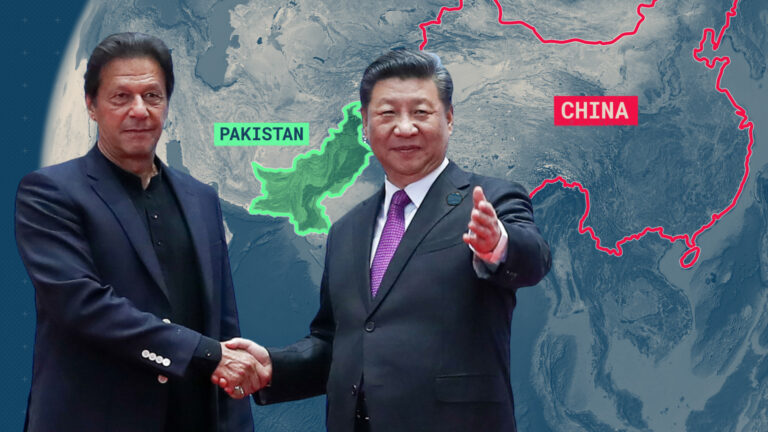
It appears that China is using Pakistan as a conduit to supply weapons to Myanmar to avoid direct implication.
According to ANI, the Myanmar military is planning to purchase 60 and 81 mm mortars, M-79 grenade launchers and heavy machine guns from Pakistan. The outlet said that Myanmar also wants to purchase air to surface missiles from Pakistan.
In 2018, Myanmar`s armed forces bought 16 JF-17 Thunder multi-role aircraft, a production of Pakistan Aeronautical Complex and the Chinese Chengdu Aerospace Corporation, from Pakistan for USD 560 million.
In September 2021, an un-announced high-level 10-member delegation from Pakistan's Defence Ministry, led by a Brigadier, met with Myanmar's Defence Minister and reportedly discussed the sale of upgraded JF-17 (Block III) aircraft.
Talks were also held on advanced ordinance technology, aircraft repair, naval munitions and Air to Surface missiles.
In the context of China's alliance with Pakistan, the perception of China using Pakistan to conduct maintenance of Chinese origin equipment and facilitating Pakistan’s Defence Industry to become an avenue for Chinese defence sales is gaining traction.
Although the Stockholm International Peace Research Institute (SIPRI) indicated that during 2019-20 the total share of Chinese arms exports declined from 5.5 to 5.2 per cent, there is a strong view that Chinese exports are being re-routed partially via Pakistan.
It is recalled that a Chinese ship bound for Pakistan was detained in 2020 by Indian authorities for carrying an autoclave, a dual-use technology, as an “industrial dryer”.
While Beijing has kept an active dialogue with the Myanmar junta, it has also indicated not being involved in the coup of Feb. 21 to bolster its international image.
Using Pakistan to act as an intermediary without directly implicating itself and minimising the surge of anti-China sentiments in a post-pandemic scenario, would enable China not only to export its military hardware unnoticed but also gain access to markets that could possibly be averse to China itself.
This revelation comes as Chinese state-owned companies, during implementation of the FDI in oil and gas project in Myanmar, have illegally acquired land by violating existing laws.
The Myanmar-China Pipeline Watch Committee (MCPWC), the only civil society organisation in Myanmar dedicated to monitoring the Myanmar-China Oil and Gas Pipeline Project, in its research found that a large-scale foreign direct investment project in the country’s oil and gas sector generated environmental destruction and had a major social impact on the life and livelihood of Myanmar’s farmers.
According to the foreign investment law, the Myanmar-China pipeline project has the right to lease the land for the pipeline route from the Myanmar government through the long-term land lease agreement.
If the lands along the pipeline route are the agricultural lands owned by the Myanmar citizen farmers, according to the 1894 land confiscation law or Article 29 of the 2012 farmland law, the concerned ministry of the Myanmar government (at that time, Ministry of Energy) was the only government entity that was entitled to conduct land acquisition from the farmers.
As per the law, after taking the necessary lands from the farmers, the ministry had to enter into a legal process to change the land title from the farmlands to the other lands, according to Article 30 of the 2012 Farmland Law, or the old law’s Article 39.
Only after the title of the lands were changed, the ministry and the project operator CNPC-SEAP Company had to make a land lease agreement according to the foreign investment law and bylaw.
“Without implementing these steps, the MOEE allowed CNPC-SEAP to directly make an agreement with the Myanmar farmers, giving an excuse that it was because the company invested their money in the compensation and when signing these agreements, it used the term “on behalf of MOGE.” Therefore, MCPWC analyzed that the agreements actually violated the above mentioned existing laws”, said a document.
Sources reveal that the Myanmar China Oil and Gas Pipeline project violated Myanmar’s existing laws because the company officials who were Chinese from the China-owned CNPC-SEAP made a direct agreement with individual Myanmar farmers to procure farmlands for the project.
The project violated Myanmar’s existing laws because it was implemented on the ground without legally changing the land title in accordance with the law.
The document said, “In the special cases in Kyaukpadaung and Ngaphe townships among the six townships where the research was conducted, the farmers do not receive any copies of the compensation agreement. Thus, the farmers did not know whether the amount of compensation that they received was the same amount as it was shown in the agreements”.
The report also examined that the CNPC took no responsibility for post-construction requirements, namely soil erosion among the pipeline resulting in damage to water resources and environmental destruction.
In effect as the land of 30 meters in width starting from the Myanmar western border to the Chinese border was acquired by Beijing, the country has in effect been split into two, resulting in affecting Myanmar’s security and national interests adversely.
READ MORE: China’s economic challenges, Europe’s downturn and the war in Ukraine.